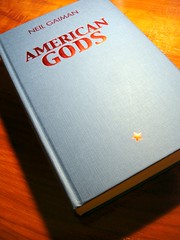 American Gods, the fourth novel by comic-book writer, children’s-book writer, short-story writer and probably-some-other-things-I’ve-missed writer Neil Gaiman, is an unholy mess. And I’m writing as a fan. The plot doesn’t work. Many of the characters are sketchy at best, completely unconvincing at worst. The protagonist goes by the laughable name of Shadow. There are a couple of rather ridiculous sex scenes, one including an Egyptian cat goddess, another which involves an unlucky chap getting consumed whole and is better left undescribed.
American Gods, the fourth novel by comic-book writer, children’s-book writer, short-story writer and probably-some-other-things-I’ve-missed writer Neil Gaiman, is an unholy mess. And I’m writing as a fan. The plot doesn’t work. Many of the characters are sketchy at best, completely unconvincing at worst. The protagonist goes by the laughable name of Shadow. There are a couple of rather ridiculous sex scenes, one including an Egyptian cat goddess, another which involves an unlucky chap getting consumed whole and is better left undescribed.It’s also an intriguing, engrossing read.
The premise goes something like this: Shadow, an unlucky ex-con, gets out of prison and is almost immediately recruited by a mysterious fellow who calls himself Wednesday. (Yes, as in the day of the week.) Turns out that Wednesday is actually an incarnation of sorts of the ancient Norse god Odin. Gaiman’s central conceit is that immigrants brought their native deities to America and, when their devotion began to wane, abandoned them to diminished lives as petty grifters. Wednesday’s goal is to bring his compatriots together against a new threat. During a confab, he proclaims, “There are new gods growing in America, clinging to growing knots of belief: gods of credit card and freeway, of Internet and telephone, of radio and hospital and television, gods of plastic and of beeper and of neon.”
That quirky central logic, the idea that American versions of ancient (and modern) gods are still bumping around, is the book’s most interesting part. Shadow encounters scores of figures from Chinese, Native American, African, Indian and German pantheons, just to name a few. Gaiman obviously possesses an encyclopedic knowledge of ancient mythology, and the ease with which he redacts his gods into the 21st century is enviable. Try to figure out you’d convincingly fit a child-snatching kobold into small-town Minnesota, and you’ll get an idea of the breadth of his imagination.
The novel also fascinates because it insists that secular, skeptical Americans still worship gods, albeit ones they may not immediately recognize. The Internet (a fat, unsocialized kid who cruises around in a limo) and Media (a pert, professionally dressed woman who speaks entirely in clichés) and Television (whose spokesmen include Mary Tyler Moore and Lucille Ball) all make appearances. “I’m the all-seeing eye and the world of the cathode ray,” Television tells Shadow. “I’m the little shrine the family gathers to adore.” When Shadow asks what sacrifices people bring her, she replies, “Their time, mostly. Sometimes each other.”
In the end, though, the theology of American Gods is strictly secular. That might seem odd, given that deities pop up everywhere from New York cabs to Midwestern supermarkets. But to a one they’re disappointingly small things, pitiful things, the product of peoples’ belief instead of the inspiration for it. Man is at the peak of Gaiman’s Olympus, not Zeus. An ancient priestess tells her tribe, “Gods are great. But the heart is greater. For it is from our hearts they come, and to our hearts they shall return.” After Shadow chides Wednesday for trying to steal $10 from a waitress, the god explodes, “What the hell else can I do? They don’t sacrifice rams or bulls to me. They don’t send me the souls of killers and slaves, gallows-hung and raven-picked. They made me. They forgot me. Now I take a little back from them.” Even Christ can’t escape marginalization. “Jesus does pretty good over here,” one being tells Shadow. “But I met a guy who said he saw him hitchhiking by the side of the road in Afghanistan and nobody was stopping to give him a ride. You know? It all depends on where you are.”
This is where the conceit starts to unravel, because a god of one’s own imagining isn’t really a god at all. Shadow’s conclusion that “people imagine and people believe: and it is that belief, that rock-solid belief, that makes things happen” rings false in a world where birds of thunder flash across the sky and leprechauns snatch gold coins from midair and the pagan goddess Estore scatters flowers behind her as she walks. A gripping plot might have distracted from this contradiction. But I suppose it’s good that it doesn’t.
(Picture: CC 2005 by neregauzak)


No comments:
Post a Comment